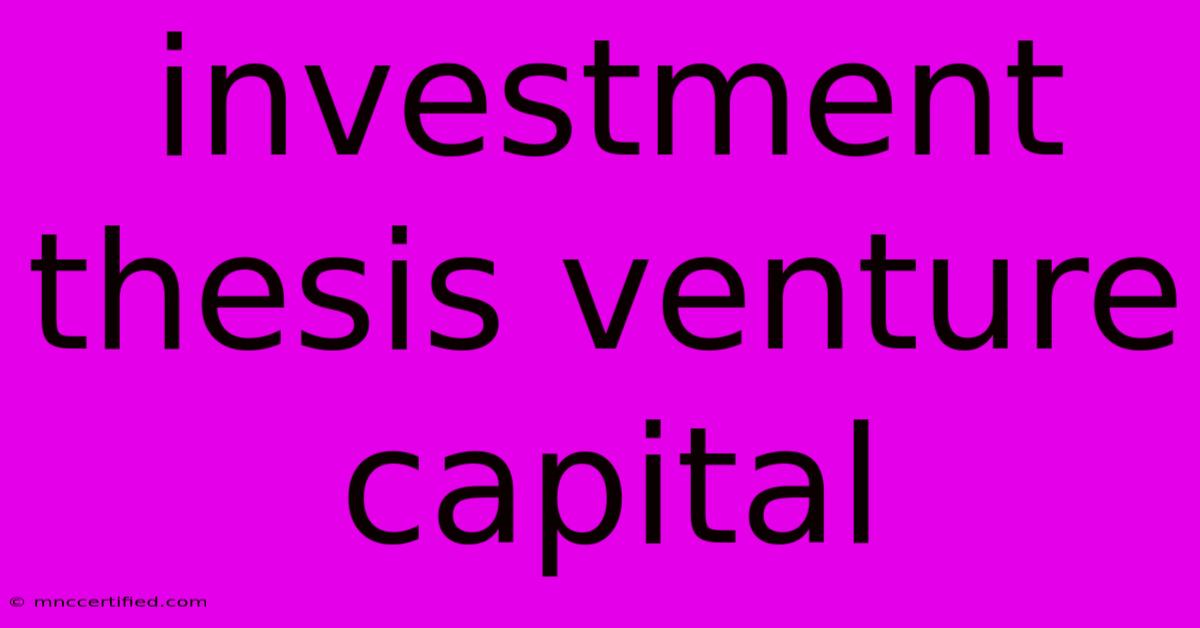Investment Thesis Venture Capital

Table of Contents
Decoding the Investment Thesis: A Venture Capitalist's Roadmap
Securing funding in the competitive landscape of venture capital (VC) requires a compelling investment thesis. This isn't just a summary of your business; it's a carefully constructed argument that convinces investors your startup deserves their capital. This article will guide you through crafting a robust investment thesis that resonates with VCs and increases your chances of securing funding.
What is a Venture Capital Investment Thesis?
An investment thesis in venture capital is a concise and persuasive document outlining why a specific investment opportunity is attractive. It's more than just a business plan; it's a focused narrative demonstrating a deep understanding of the market, the company's potential, and the reasons why it's poised for significant growth and return on investment (ROI). It articulates the why behind the investment, addressing both the opportunity and the risks. It should answer crucial questions for potential investors, such as:
- What problem are you solving? And is it a significant enough problem to warrant investment?
- What's your solution, and why is it better than existing alternatives? This requires a competitive analysis.
- What is your market opportunity? Clearly define your target market and its size.
- What's your business model? How will you generate revenue and achieve profitability?
- What's your team's expertise and experience? Investors invest in people as much as ideas.
- What's your exit strategy? How will investors realize a return on their investment (e.g., IPO, acquisition)?
- What are the key risks and how will you mitigate them? Transparency is crucial.
Key Components of a Winning Investment Thesis
A strong VC investment thesis incorporates these essential elements:
1. Market Opportunity Analysis: Sizing the Prize
This section focuses on the market size, growth potential, and competitive landscape. Demonstrate a deep understanding of your target market, including its demographics, needs, and purchasing behavior. Provide compelling data and research to support your claims. Highlight market trends that favor your business and quantify the potential market share you can capture. Use tools like market sizing reports, industry analyses, and competitive landscaping to reinforce your claims. Don't underestimate the importance of market validation – showing traction and early adoption.
2. Solution & Competitive Advantage: Standing Out from the Crowd
Clearly articulate your solution and explain why it's superior to existing alternatives. Identify your unique selling proposition (USP) and emphasize what differentiates you from competitors. This could be through superior technology, a stronger team, a more efficient business model, or a better go-to-market strategy. A thorough competitive analysis showcasing your advantages is critical. Don't be afraid to highlight your competitors' weaknesses.
3. Business Model & Financial Projections: Path to Profitability
Detail your revenue model, cost structure, and projected financials. Show how you plan to generate revenue, achieve profitability, and scale your business. Include realistic financial projections, demonstrating a clear path to a significant return on investment for the VC firm. Investors look for strong unit economics and a clear path to profitability, even if it's in the longer term.
4. Team & Execution: The Human Element
VCs invest in people as much as ideas. Highlight your team's experience, expertise, and track record. Show why your team is uniquely positioned to execute your business plan and achieve your ambitious goals. Emphasize relevant experience, skills, and networks.
5. Exit Strategy & Valuation: The Return on Investment
Outline your envisioned exit strategy, which might include an initial public offering (IPO), acquisition by a larger company, or another viable exit route. Justify your valuation based on market comparables, projections, and your anticipated future performance.
On-Page and Off-Page SEO Strategies for Your Investment Thesis
While your investment thesis itself isn't a website, you can still apply SEO principles to the document itself, and the way you present it:
- Keyword Optimization: Use relevant keywords throughout the document, such as "venture capital," "investment thesis," "market opportunity," "business model," "exit strategy," and relevant industry-specific terms. However, avoid keyword stuffing.
- Clear and Concise Writing: VCs are busy. Your thesis needs to be easy to read and understand.
- Data-Driven Approach: Support your claims with data and research to enhance credibility.
- Compelling Narrative: Frame your investment thesis as a compelling story that captures the investor's attention.
- Professional Presentation: Use high-quality visuals and formatting to create a professional and polished presentation.
- Networking: Attend industry events, connect with investors on LinkedIn, and leverage your network to get your investment thesis in front of the right people.
By meticulously crafting a compelling investment thesis that integrates these elements and incorporates sound SEO strategies throughout your communication, you significantly improve your chances of securing the venture capital needed to bring your vision to life. Remember, it's a collaborative process; be prepared to adapt your thesis based on feedback from potential investors.

Thank you for visiting our website wich cover about Investment Thesis Venture Capital. We hope the information provided has been useful to you. Feel free to contact us if you have any questions or need further assistance. See you next time and dont miss to bookmark.
Featured Posts
-
Title Insurance Business For Sale
Nov 20, 2024
-
Investment Casting Vs Die Casting
Nov 20, 2024
-
Shelter Insurance Lawrenceburg Tn
Nov 20, 2024
-
Is A Gold Chain A Good Investment
Nov 20, 2024
-
State Bar Of Texas Life Insurance
Nov 20, 2024